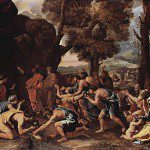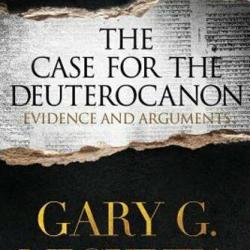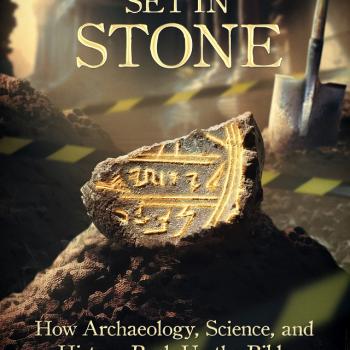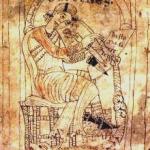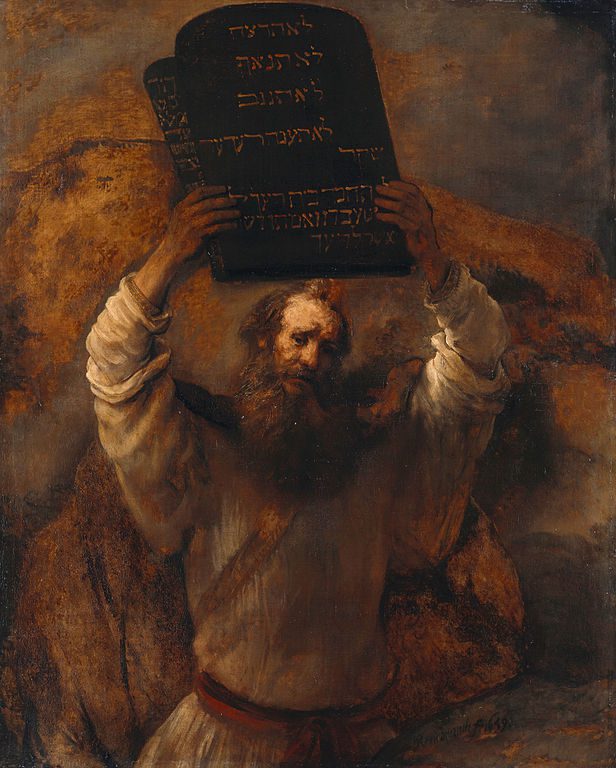
Moses Smashing the Tablets of the Law (1659), by Rembrandt (1606-1669) [public domain / Wikimedia Commons]
* * * * *
I encountered a question on the Coming Home Network board from a person who was trying to answer a friend, regarding the text of Numbers 31:14-18 (RSV):
And Moses was angry with the officers of the army, the commanders of thousands and the commanders of hundreds, who had come from service in the war. Moses said to them, “Have you let all the women live? Behold, these caused the people of Israel, by the counsel of Balaam, to act treacherously against the LORD in the matter of Pe’or, and so the plague came among the congregation of the LORD. Now therefore, kill every male among the little ones, and kill every woman who has known man by lying with him. But all the young girls who have not known man by lying with him, keep alive for yourselves.
This second person puzzled over why Moses would want to command the killing of males, young and old, and non-virgin women, while keeping alive the virgins? This created a doubt as to whether Moses was two-faced, or a prophet some of the time, and giving merely his own sinful, arbitrary opinions on other occasions.
The solution to the “dilemma” is that God is judge. He has the prerogative to judge nations, with perfect justice. The entire human race is fallen and subject to original sin. If God chooses to judge a nation (as in this case) it is the right decision. He also judged Israel on various occasions; most notably by the Babylonians in the 6th century B.C. — when the Temple was destroyed and the Jews were taken into captivity for a long time. He gives life and can take it away. God is not just another man.
The massacres of the Old Testament involve a long, complicated explanation. I’ve given the nutshell version. If anyone wants a great deal of depth and “meat” they can consult my paper (with lots of related links to other material):
“How Can God Order the Massacre of Innocents?” (Amalekites, etc.)
Some argue that Moses was speaking fallibly and without divine inspiration in this instance. But that doesn’t apply here at all because Moses was applying God’s express command. In Numbers 31:17-18, Moses states:
Now therefore, kill every male among the little ones, and kill every woman who has known man by lying with him. But all the young girls who have not known man by lying with him, keep alive for yourselves.
This was an instance of divine judgment or wrath. Moses cannot, therefore, be blamed with giving immoral advice without implicating God in the same charge. God had commanded Moses earlier in the chapter (Numbers 31:1-3, 7):
The LORD said to Moses, “Avenge the people of Israel on the Mid’ianites; afterward you shall be gathered to your people.” And Moses said to the people, “Arm men from among you for the war, that they may go against Mid’ian, to execute the LORD’s vengeance on Mid’ian. . . . They warred against Mid’ian, as the LORD commanded Moses, and slew every male.
The reason Moses was justifiably mad was because the armies hadn’t fully followed God’s instructions. This had long been a problem in Israel, and would be on many occasion: they would incompletely follow what God told them to do, only to be corrupted by the evil pagan nations that they conquered. This is not my speculation only; it is in the text itself, in the two verses before our passage under consideration:
Moses said to them, “Have you let all the women live? Behold, these caused the people of Israel, by the counsel of Balaam, to act treacherously against the LORD in the matter of Pe’or, and so the plague came among the congregation of the LORD.
Moses was referring (“matter of Pe’or”) to an earlier incident, recorded in Numbers 25:1-13, 16-18:
While Israel dwelt in Shittim the people began to play the harlot with the daughters of Moab. These invited the people to the sacrifices of their gods, and the people ate, and bowed down to their gods. So Israel yoked himself to Ba’al of Pe’or. And the anger of the LORD was kindled against Israel; . . . And the LORD said to Moses, “Harass the Mid’ianites, and smite them; for they have harassed you with their wiles, with which they beguiled you in the matter of Pe’or, . . . (cf. Deut 4:3-4)
Numbers 25:6-15 discusses an incident of Zimri and a Midianite woman named Cozbi. This was how the Israelites become corrupted: by intermarriage with those who practiced idolatry. God wanted to eliminate this possibility (25:8, 10-11). While He is judging one wicked nation, He is also preserving His chosen people for His purposes. The New Bible Dictionary (“Midianites” – p. 821) states:
Later, in the plains of Moab, the chiefs of Midian and Moab combined in hiring Balaam to curse Israel (Num 22 ff.) and their people led Israel into idolatry and immorality (Num 25), and so had to be vanquished (Num 25:16-18, ch. 31).
This is a very common Old Testament motif. It happens again and again. In Ezra 10:1-19, 44 (cf. 9:1-2, 14-15), many Israelites “sent away” the “foreign women” they had married, not simply because they were foreigners, but because they caused them to become corrupted by false religions and idolatry (see. e.g., Deut 17:17; Neh 13:23-28). This was, by the way, essentially the same as an annulment, as opposed to a divorce. See, e.g.:
Deuteronomy 12:29-31 “When the LORD your God cuts off before you the nations whom you go in to dispossess, and you dispossess them and dwell in their land, take heed that you be not ensnared to follow them, after they have been destroyed before you, and that you do not inquire about their gods, saying, `How did these nations serve their gods? — that I also may do likewise.’ You shall not do so to the LORD your God; for every abominable thing which the LORD hates they have done for their gods; for they even burn their sons and their daughters in the fire to their gods.
Others argue that passages such as these are taken out of context and divorced from the overall meaning of this book of Scripture. Again, that is not applicable here precisely because I put the passage in context and showed how Moses was following God’s instruction. This is inspired Scripture. We can’t simply pass off something as an error of man unless the text instructs us clearly that this is so. I gave the larger meaning and context too, in showing how this was an instance of divine judgment, and provided some of the sordid history of the Midianites, whom God judged.



